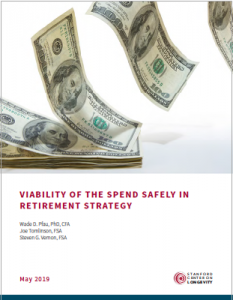VIABILITY OF THE SPEND SAFELY IN RETIREMENT STRATEGY
The Stanford Center on Longevity, in collaboration with the Society of Actuaries, has analyzed the feasibility of the Spend Safely in Retirement Strategy (SSiRS), a straightforward retirement income strategy that could be implemented in virtually any IRA or 401k plan. The SSiRS can serve as a framework for deciding when to retire and how to deploy savings in retirement.
Here are a few highlights of the report:
- The SSiRS consists of optimizing Social Security benefits and using the IRS requirement minimum distribution to generate periodic retirement income, coupled with a low-cost stock index, balanced, or target date fund.
- This strategy compared favorably to 292 retirement income strategies that we analyzed, including various types of annuities and systematic withdrawal plans using invested assets. For this comparison, we used stochastic forecasts and efficient frontiers, powerful analytical techniques that are used to develop funding and investment strategies for large defined benefit plans.
- We demonstrated that delaying retirement can significantly increase ultimate retirement income.
- We highlight a basic planning dilemma facing older workers and their advisers: Investing in equities during retirement has the potential to significantly increase retirement incomes, most of the time but not always.
- The report describes several refinements to the strategy and work-arounds that reflect personal goals and circumstances.
- We analyzed the impact of a retiree’s health on the choice of retirement income strategies. We conclude that to justify using poor health to influence your retirement income strategy, you need to be really sick, such as receiving a diagnosis of a life-shortening illness. However, moderately poor health, such as being overweight or with poor health metrics, might justify using a refinement of the SSiRS.
- We analyzed the effect of capital market assumptions for developing retirement income strategies. Using historical assumptions results in dramatically higher projected incomes than using forward-looking assumptions, reflecting the current low-interest environment. This result can influence a retiree’s choice of retirement spending.
- We propose that DC plan sponsors implement a basic menu of retirement income options that complements the familiar investment menu. Such a menu can help older workers easily implement effective retirement income strategies within their DC plan.


